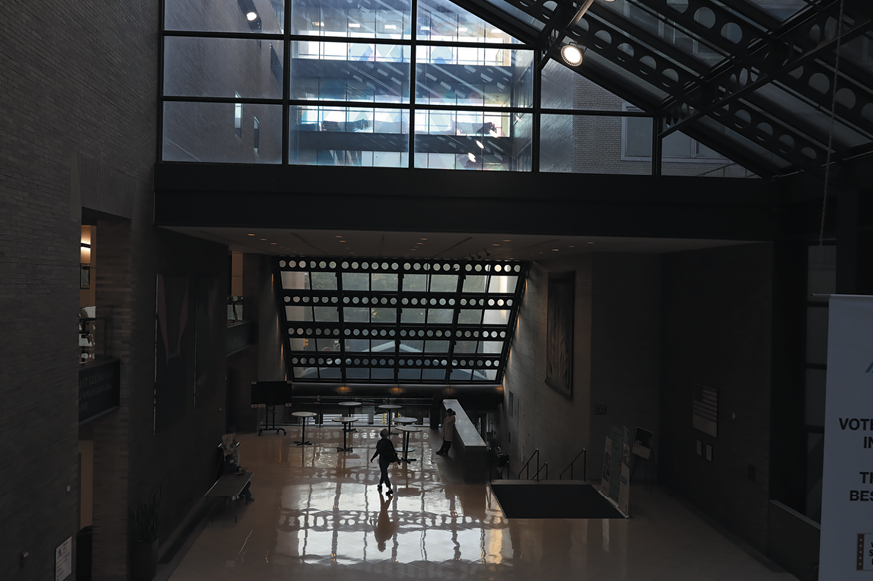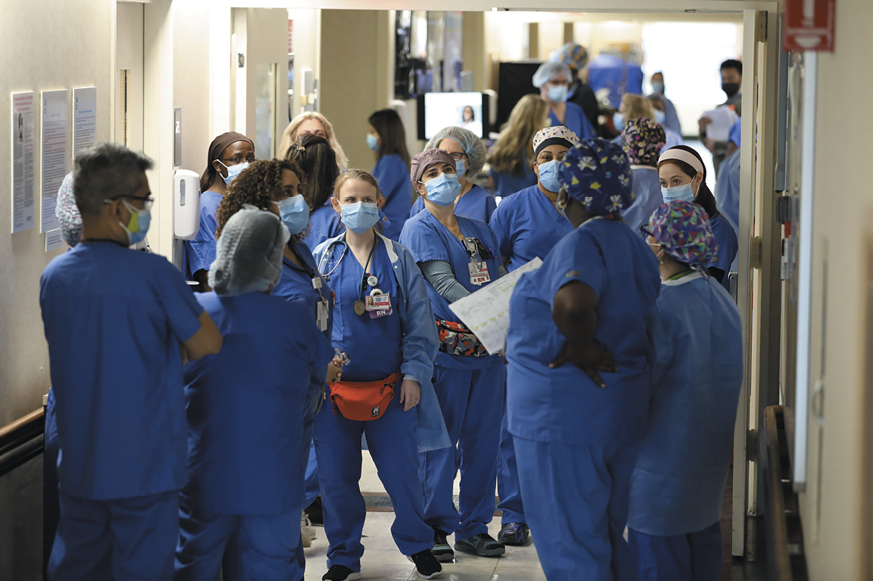- Home
- Media Kit
- MediaJet
- Current Issue
- Past Issues
- Ad Specs-Submission
- Ad Print Settings
- Reprints (PDF)
- Photo Specifications (PDF)
- Contact Us
![]()
ONLINE
![]()
ONLINE

Serving Marginalized Populations
Editors’ Note
Brendan Carr is nationally recognized as a leader in academic medicine and health policy. He has practiced clinical emergency medicine for more than 20 years, is a renowned emergency physician and health policy researcher. He has focused on building regional systems of emergency care, especially for trauma, stroke, cardiac arrest, and sepsis, and developing innovative delivery system solutions to create a more distributed and accessible acute-care delivery system. He has served in an advisory role to domestic and international organizations and is a member of the National Academy of Medicine. Carr previously served on the faculty at the Perelman School of Medicine at the University of Pennsylvania and as an Associate Dean of the Sidney Kimmel Medical College at Thomas Jefferson University in Philadelphia. In addition to his academic accomplishments, he also served the U.S. Department of Health and Human Services in a variety of roles focused on improving trauma and emergency care delivery for the nation. Most recently, he was a special adviser on preparedness and response. In that capacity, his principal focus was on understanding how the emergency care infrastructure of the nation’s healthcare system could be strengthened to ensure the ability to respond during large-scale threats to the public’s health. Carr earned his medical degree from Temple University School of Medicine, and completed both his residency in emergency medicine and his fellowship in trauma and surgical critical care at the University of Pennsylvania. He is an alumnus of the Robert Wood Johnson Foundation’s Clinical Scholars Program and holds master’s degrees in both clinical psychology and health policy research. An accomplished researcher, he has authored more than 175 manuscripts, and has received funding from the National Institutes of Health, the Agency for Healthcare Research and Quality, the Centers for Disease Control and Prevention, and multiple foundations.
Institution Brief
Mount Sinai Health System (mountsinai.org) encompasses the Icahn School of Medicine at Mount Sinai, the Mount Sinai Philips School of Nursing and eight hospitals, as well as a large and expanding ambulatory care network. The eight hospitals – Mount Sinai Brooklyn, The Mount Sinai Hospital, Mount Sinai Queens, Mount Sinai St. Luke’s, Mount Sinai South Nassau, Mount Sinai West, New York Eye and Ear Infirmary of Mount Sinai and Mount Sinai Beth Israel – have a vast geographic footprint throughout the New York metropolitan region.

Guggenheim Pavilion at The Mount Sinai Hospital
Will you discuss your career journey as you have recently assumed the role of chief executive officer of Mount Sinai Health System?
I think about the experiences of the different chapters of my professional life, and the big three in healthcare are clinical care, education, and research. The other two pieces that are important to me are the creativity and innovation on how we deliver care, and the service to community. I went to a Jesuit university to learn the principles of social justice, and then to Temple University for medical school which is located in a part of Philadelphia that is poor and marginalized, and there is a commitment to service at Temple. Following Temple, I went to University of Pennsylvania where I learned the rigor of research and where I competed with the best and brightest in the research space. I then went to Thomas Jefferson University Health System where I learned how to be creative and innovative in how to deliver healthcare.
I bring the clinical, education, research, and creativity to this new role which resonates with the team at Mount Sinai Health System.
What have been the keys to the strength and leadership of Mount Sinai Health System?
The book that was written about Mount Sinai, This House of Noble Deeds, tells the story of the origins of the institution. This is a place that was built to take care of marginalized populations, which was marginalized Jews at that time, and then the hospital built a medical school which led to building a health system. The size and scale of Mount Sinai has changed, but the story and the mission has remained. The leadership of Mount Sinai throughout the years has never wavered on our mission and the commitment to serving marginalized populations, and the need to balance the business of healthcare with the social justice aspect of healthcare. This is in the DNA of Mount Sinai.

Staff at Mount Sinai Health System
What do you see as the role of the health system in driving the health and well-being of marginalized communities?
It is important to note that the business of healthcare delivery is getting harder and harder. The majority of nonprofit health systems face challenges operating with slim margins. I fear that the business challenges will impact efforts to address social determinants of health, preventative care, and engagement with the community – especially those that are marginalized. We need to get serious about addressing the challenge being caused by the business side of healthcare.
This issue will take all partners in the ecosystem, from providers and health systems to the education sector and the business community. Population health is about taking care of the populations that you serve, and to tip the scale we need to build a partnership across all these channels since it takes all of us working together to make positive impacts on the public’s health.
How do you define health?
There are many in our industry that define health by the delivery of care, such as an amazing transplant or a recovery from cancer, but when you zoom out a little we all understand that health is so much bigger. It involves the way we live our lives, including our mental health and the need to feel supported. It all depends on context – when you are running a health system, you need to be better at the things that no one else can do, which relates to the delivery of care – but we know that health is much bigger, and we need to address all the areas that impact health.
“The leadership of Mount Sinai throughout the years has never wavered on our mission and the commitment to serving marginalized populations…”
How important is it for Mount Sinai Health System to build a diverse and inclusive workforce to mirror the diversity of its patients and the communities it serves?
This is important beyond words, and the people we serve want and need to see people like them. It provides a much different level of comfort when you are being treated by a person who speaks your same language or comes from your same community. We place a major focus on diversity and inclusion, and we are intentional about building a pipeline of talent that mirrors the diversity of the communities we serve.
Will you highlight the medical school and the impact that it has made on the health system?
There are certain individuals who really deserve the praise for what they have done in thinking about the students we are recruiting and the way that we are educating them at our medical school. This was all built before I arrived, and it was the vision and foresight of others to build a medical school that has a broad definition of health and an innovative curriculum in preparing the future leaders in the industry. We do this in small groups and hands-on opportunities where you are not solely learning from a book, but seeing firsthand what it means to deliver care and serve patients.
It is exciting to see the level of talent coming into the industry and at the Icahn School of Medicine at Mount Sinai. We are committed to developing students that will be on the front lines of tackling the future challenges in healthcare.

Icahn School of Medicine at Mount Sinai in New York City
You have spent your career taking care of patients. Will it be hard to continue to have patient interaction as you lead Mount Sinai Health System in your new role?
This is going to be hard to balance, but I am going to try because being with patients is grounding and it really provides the opportunity to feel the pulse of the organization. I feel it is important to have patient interactions in order to be reminded of the complexities of people’s lives and how their health outcomes are connected to that. It is also special for me to be surrounded by residents and doctors and nurses that provide such energy in the clinical setting – it is a magical feeling.
Are you still surprised to see the amazing things that take place at Mount Sinai Health System on a daily basis?
The amazing things keep changing – not a day goes by that I do not see or experience something that is astounding to me. One example would be gene therapy. When I think about what we knew when I was coming up in the profession about gene therapy, and what our researchers are now working on to achieve, it is truly shocking. It’s continuous innovation and it’s very exciting. There are people who are working every day to make sure that we advance health for people now and in the future.![]()